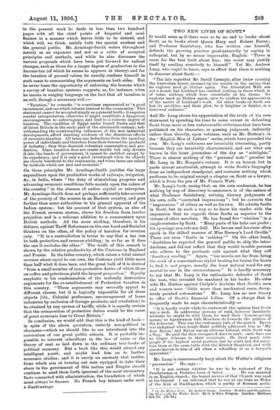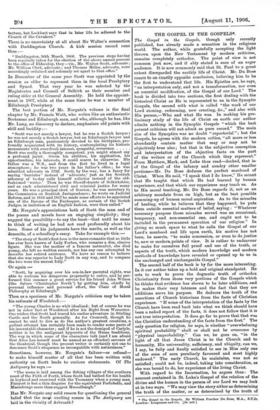TWO NEW LIVES OF SCOTT.* IT would seem as if
there were to be no end to books about Scott, as to books about Queen Mary and Robert Burns ; and Professor Saintsbury, who has written one himself, defends the growing practice good-naturedly by saying in colloquial, but by no means impeccable, English: "There is room for the best book about him ; the worst may justify itself by sending somebody to himself." Yet Mr. Andrew
Lang, who ought to know, says in effect that there is nothing to discover about Scott:— "The late regretted Mr. David Carnegie, after twice crossing the Australian desert, summed up his results in the saying that no explorer need go thither again. The Abbotsford MSS. are not a desert, but Lockhart has omitted nothing in them which is of value, nothing which bore essentially on his theme. No explorer need go thither again, save to confirm his appreciation of the merits of Lockhart's work. All other books on Scott are but its satellites, and their glow, be it brighter or fainter, is a borrowed radiance."
And Mr. Lang shows his appreciation of the truth of his own statement by spending his time to some extent in defending Scott from more or less unfavourable criticisms that have been published on his character, or passing judgment, indirectly rather than directly, upon volumes, such as Mr. Hutton's in the "English Men of Letters" series, which have preceded his own. Mr. Lang's criticisms are invariably interesting, partly because they are invariably characteristic, and are what are known in the loose journalese of the day as "sidelights." There is almost nothing of the "personal note" peculiar to Mr. Lang in Mr. Norgate's volume. It is an honest, but in parts almost amateurish, attempt to write Scott's biography from an independent standpoint, and contains nothing which professes to be original except a chapter on Scott as a lawyer, which is from the pen of Mr. Francis Watt.
Mr. La.ng's book, seeing that, on his own confession, he has nothing by way of discovery to announce, is of the nature of what Professor Saintsbury, revising literary judgments of his own, calls "corrected impressions" ; but he corrects the
" impressions " of others as well as his own. He admits faults in Scott, but in such a way as to leave his reader with the impression that he regards these faults as superior to the virtues of other novelists. He has found five " whiches " in a single sentence by Scott. "Many parts of his tales are prolix ; his openings as a rule are dull. His heroes and heroines often speak in the stilted manner of Miss Burney's Lord Orville." There are even "faults in 'artistry.'" On the other hand, "doubtless he expected the general public to skip the intro- ductions, and did not reflect that they would trouble persons who adhere to the puritanic rule against what they call
desultory reading." Again, "the novels are far from being the work of a conscientious stylist beating his brains for hours
to find is mot propre, usually the least natural word for any mortal to use in the circumstances." It is hardly necessary to say that Mr. Lang is the enthusiastic defender of Scott
the man, who revealed his manhood in his books. He sides with Mr. Hutton against Carlyle's doctrine that Scott's men and women were "little more than mechanical cases, decep- tively painted automatons." Mr. Lang has no new theory to offer of Scott's financial follies. Of a charge that is frequently made be says characteristically:—
" It is hardly worth while to controvert the opinion that Scott was a snob. In addressing persons of rank, however familiarly intimate he might be with them, he used their honour-giving names,' as Agamemnon bids Menelaus do towards the princes of the Achaeans. This was the customary rule of the period. Byron was indignant when Leigh Hunt publicly addressed him as My dear Byron,' and Byron was an extreme Liberal, while Scott was a Tory. He paid the then recognised dues to rank ; such dues are no longer welcome to their recipients. He lived much with people of the highest social position, but he could and did enter- tain them at the same table with the Ettrick Shepherd, and with guests known to him of old when a schoolboy or as a lawyer's apprentice."
Mr. Lang is unnecessarily hazy about Sir Walter's religious "persuasion." He says :—
"It is not certain whether he was to be reckoned of the Presbyterian or Prelatist form of belief. . . . . He was married in an English church ; the burial service of that Church was read at his funeral. I am informed that he was at one time an Elder of the Kirk at Dnddingston, which is partly of Norman archi- " (1) Sir Walter Scott. By Andrew Lang. London : Hodder and Stoughton. (Si. 6&]—(2) Sir Waiter Scott. By G. le Grys Margate. London; Methuen and Co. [7e. (MA tecture, but Lockhart says that in later life he adhered to the Church of the Cavaliers.'
There is no uncertainty at all about Sir Walter's connection with Duddingston Church. A kirk session record runs thus :— "Duddingston, 30th March, 1806. The previous steps having been regularly taken for the election of the above named persons to the office of Eldership, they—viz., Mr. Walter Scott, advocate ; Mr. William Clerk, advocate ; and Thomas Miller, advocate, were accordingly ordained and solemnly set apart to that office."
In December of the same year Scott was appointed by the
session as elder to represent them in the local Presbytery and Synod. That very year he was selected by the Magistrates and Council of Selkirk as their member and ruling elder at the General Assembly. He held the appoint- ment in 1807, while at the same time he was a member of Edinburgh Presbytery.
The best portion of Mr. Norgate's volume is the final chapter by Mr. Francis Watt, who writes like an enthusiastic Scotsman and Edinburgh man, and who, although he has, like Mr. Lang, no discovery to declare, emphasises old points with skill and lucidity :—
" Scott was not merely a lawyer, but he was a Scotch lawyer ; lie was not merely a Scotch lawyer, but an Edinburgh lawyer and an Edinburgh man, passionately devoted to his birthplace, pro- foundly acquainted with its history, contemplating its historic monuments with ever-fresh interest, sympathy, reverence Scott was really a thoroughly competent, you might almost say a profound jurist. Given his abilities, his application, his opportunities, his interests, it could scarce be otherwise. His father was a W.S., and from the first he lived in a legal atmosphere ; he was two years in his father's office ; he was admitted advocate in 1792. Scott, by the way, has a fancy for saying 'barrister' instead of 'advocate,' just as the Scottish attorney of to-day calls himself solicitor instead of the old- fashioned writer! Then he was Sheriff-depute of Selkirkshire, and as such administered civil and criminal justice for many years. He was a principal clerk of Session ; he was secretary to the Commission on Scottish Jurisprudence ; he wrote on Judicial Reform, and in 1816 and 1817 he made some efforts to be appointed one of the Barons of the Exchequer, as certain of the Scotch Judges, in imitation of an English fashion, were then called."
Mr. Norgate's appreciations both of Scott the man and of the poems and novels have an engaging simplicity; they suggest the possibility—to say the least—that until he came to think of writing he had not read profoundly about his hero. Some of his judgments have the merits, as well as the demerits, of a schoolboy's essay. Take for example this :—
" The story of Scott's first love is the more romantic that so little has ever been known of Lady Forbes, who remains a dim, elusive figure. She was the mother of a famous naturalist, she died young, she left no written records, nor has any one attempted to describe her retired existence. We have no reason to believe that she was superior to Lady Scott in any way, and to compare the two were the merest folly."
Or again :— "Scott, by acquiring over his son-in-law parental rights, was able to restrain his dangerous propensity to satire, and he per- formed this summer a great service for his friend John Wilson (the future Christopher North') by getting him, chiefly by personal influence and personal effort, the Chair of Moral Philosophy at Edinburgh.'
Then as a specimen of Mr. Norgate's criticism may be taken his estimate of Woodstock :— " The young Charles is no whit idealised ; but of course he was not in sober fact at Woodstock after his flight from Worcester. One wishes that Scott had traced his earlier adventure in Stirling Castle and the North generally. As for Cromwell, though he cannot be said to live as do the author's greatest creations, a gallant attempt has certainly been made to render some parts of his inscrutable character ; and if he is not the demigod of Carlyle, neither is he the malignant hypocrite of the Hume traditions. The way in which some of the characters talk (and I am afraid that Alice Lee herself must be named as an offender) savours of the theatrical, though the present writer is certainly not one to denounce Scott's eloquence as incompatible with naturalness."
Sometimes, however, Mr. Norgate's failure—or refusal— to make himself master of all that has been written with
authority on Scott leads to curious statements. Of The Antiquary he says :— "The scene is laid among the fishing villages of the southern coast of the Firth of Forth, where Scott had bathed for his health in boyhood and exercised with the Yeomanry when a young man. Fairport is but a thin disguise for the equivalent Portobello, and Musselcrags more than suggest Musselburgh."
Has Mr. Norgate any solid reason for questioning the general belief tbat the most exciting scenes in The Antiquary are laid in the vicinity of Arbroath P



































 Previous page
Previous page